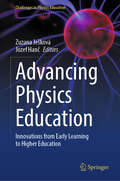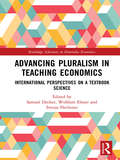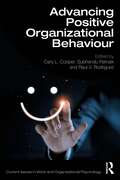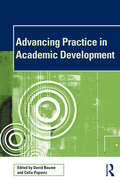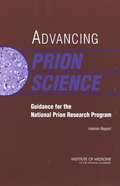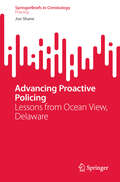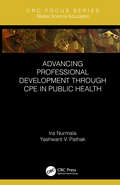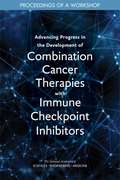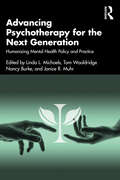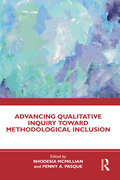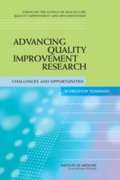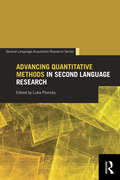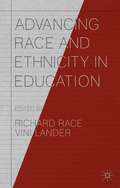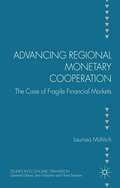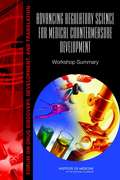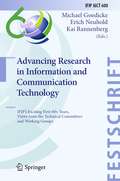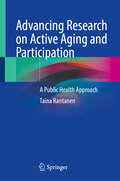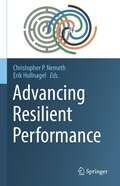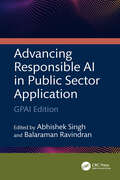- Table View
- List View
Advancing Physics Education: Innovations from Early Learning to Higher Education (Challenges in Physics Education)
by Zuzana Ješková Jozef HančThis book offers a rich selection of papers from a conference dedicated to the advancement of physics education at all levels. Addressing the pressing need for innovation in teaching and learning, the contributions span pre-school to higher education, showcasing a broad spectrum of innovative proposals aimed at enriching the physics learning experience. The contributions reflect key thematic tracks, including innovative strategies and pathways to improve physics education, lab work and experiments in physics education, digital technologies in physics education, and school-university collaborations. These tracks provide a cohesive structure, while the individual contributions present research-informed insights and exemplary teaching practices that resonate across age groups and educational contexts. For pre-school and primary learners, the papers highlight creative learning pathways, hands-on activities, and play-based strategies that introduce young minds to fundamental physical concepts in an engaging and accessible way. At the secondary level, the focus shifts to inquiry-based teaching practices, lab work, and the integration of digital tools that develop students&’ critical thinking skills and deepen their understanding of core physics principles. For higher education, the papers present advanced experimental techniques and interdisciplinary approaches, demonstrating effective strategies for teaching complex concepts to university students as well as novel methods for fostering connections between schools and universities, emphasizing how collaboration enhances teaching practices and supports student learning. Additionally, the contributions examine how physics education research informs these practices, ensuring that the methods presented are not only innovative but also evidence-based. Grounded in physics education research, the book bridges the gap between theory and practice. Many of the contributions draw on real-world classroom experiences, offering practical applications alongside research findings. This makes the book an invaluable resource for educators, researchers, and policymakers seeking to advance physics education across all levels.
Advancing Pluralism in Teaching Economics: International Perspectives on a Textbook Science (Routledge Advances in Heterodox Economics)
by Wolfram Elsner Samuel Decker Svenja FlechtnerThe complex economic problems of the 21st century require a pluralist, real-world oriented and innovative discipline of economics that is capable of addressing and teaching these issues to students. This volume is a state-of-the-art compilation of diverse, innovative and international perspectives on the rationales for and pathways towards pluralist economics teaching. It fosters constructive controversy aiming to incite authors and commentators to engage in fruitful debates. This volume addresses a number of key questions: Why is it important for a social science to engage in pluralistic teaching? What issues does pluralist teaching face in different national contexts? Which traditions and practices in economic teaching make pluralist teaching difficult? What makes economics as a canonical textbook science particular and how could the rigid textbook system be innovated in a meaningful way? What can we learn from school education and other social science disciplines? Through examining these issues the editors have created a pluralist but cohesive book on teaching economics in the contemporary classroom drawing from ideas and examples from around the world. Advancing Pluralism in Teaching Economics offers a valuable insight into the methodology and application of pluralist economics teaching. It will be a great resource for those teaching economics at various levels, as well as researchers.
Advancing Positive Organizational Behaviour (Current Issues in Work and Organizational Psychology)
by Cary L. Cooper Raul V. Rodriguez Subhendu PatnaikThis comprehensive book provides an overview on the present status of positive organizational behaviour, offering insights on the growing body of research and scholarship, as well as suggestions for future directions in the field. Recent times have seen phenomenal and unprecedented changes in work settings, with many transitioning to hybrid or fully remote arrangements. In addition, unwarranted and unscrupulous application of technology, detrimental ramifications of work stress, and impaired well-being at work are posited to create an unsustainable work environment.Bringing together leading experts from around the world, this collection synthesizes and captures the advancements within the discipline of positive organizational behaviour. It covers such topics as: psychological capital, work engagement interventions, self-efficacy, emotions and positive work behaviour, free will, resilience, work wellbeing, evolutionary psychology and positive workplace, cross-cultural positive organizational behaviour, common-good HRM practices, and methodological advances and challenges in positivity assessments.The book offers a valuable resource for students and scholars of work/organizational psychology, organizational behaviour and applications of positive psychology. It is also a useful reference for organizations looking to understand and implement positive organizational policies in their workplaces.
Advancing Practice in Academic Development (SEDA Series)
by David Baume Celia PopovicWithin the field of academic development, the last twenty years have seen a great expansion of published research into practice and the further development of theoretical approaches. This growth in the scholarship of academic development matches a growth in the scholarship of teaching and learning. Advancing Practice in Academic Development draws on these evolving scholarships to advance professional practice in academic development, addressing questions such as: . How have global academic developers and their units developed and changed over recent decades? How has the context in which academic development work is done altered? What have academic developers and their professional associations learnt? Case studies and examples are used throughout the text to illustrate development scenarios and methods. Academic development is considered as, among others, a critical, a scholarly, a principled, a pragmatic, a supporting and a leadership role. This book is ideal for use on academic development courses run by SEDA and other international organisations as well as by those who have responsibility for leading the improvement of educational practice. Written in a scholarly, accessible, stimulating and practical style, this book acknowledges difficulties and offers ways forward. As well as analysing problems, it offers solutions. Links to web sources referenced in this book can be found at www.seda.ac.uk/apad
Advancing Prion Science: Guidance for the National Prion Research Program
by Committee on Transmissible Spongiform Encephalopathies: Assessment of Relevant ScienceReport on Advancing Prion Science
Advancing Prion Science: Guidance for the National Prion Research Program
by Institute of Medicine of the National AcademiesIn Advancing Prion Science, the Institute of Medicine's Committee on Transmissible Spongiform Encephalopathies Assessment of Relevant Science recommends priorities for research and investment to the Department of Defense's National Prion Research Program (NPRP). <P><P>Transmissible spongiform encephalopathies (TSEs), also called prion diseases, are invariably fatal neurodegenerative infectious diseases that include bovine spongiform encephalopathy (commonly called mad cow disease), chronic wasting disease, scrapie, and Creutzfeldt-Jakob disease. To develop antemortem diagnostics or therapies for TSEs, the committee concludes that NPRP should invest in basic research specifically to elucidate the structural features of prions, the molecular mechanisms of prion replication, the mechanisms of TSE pathogenesis, and the physiological function of prions' normal cellular isoform. Advancing Prion Science provides the first comprehensive reference on present knowledge about all aspects of TSEs-from basic science to the U.S. research infrastructure, from diagnostics to surveillance, and from prevention to treatment.
Advancing Proactive Policing: Lessons from Ocean View, Delaware (SpringerBriefs in Criminology)
by Jon ShaneThis brief documents a demonstration project undertaken in Ocean View, Delaware on a novel, scalable tool for police agencies seeking to optimize their patrol operations while providing transparency and accountability in resource management. It describes and explains the broader set of circumstances, conditions, and factors that surrounded and influenced the Ocean View Police Department&’s goal to expand the agency toward proactive policing. This work encompasses the social, economic, political, and technical aspects that affected the design, implementation, and outcome. The central research question was: If the Ocean View Police Department increases proactive time from 67% to 75%, then how many officers do we need, and what are the projected costs? The study offers a roadmap for agencies looking to expand their proactive policing efforts, and understand the cost drivers associated with the patrol function. The book details the demands that police agencies face and the complexities of their work. The chapters that follow acknowledge the managerial and fiscal difficulties related to staffing and funding the police, while simultaneously offering suggestions for increased community collaboration. The universal model presented here can be used by all police executives, elected and appointed city officials, academics, finance and directors, analysts.
Advancing Professional Development through CPE in Public Health (Global Science Education)
by Yashwant V. Pathak Ira NurmalaThe education division is a prominent part of the public health profession. It focuses on educating individuals and communities to promote health and prevent disease. The educators are drawn from a diverse range of disciplines and defined as professionally prepared individuals who serve in a variety of roles using appropriate educational strategies and methods to facilitate the development of policies, procedures, interventions, and systems conducive to the health of individuals.This unique volume in the Global Science Education Series describes some of the challenges faced by this profession in helping the audience to understand public health and solve health issues. Key Features: Aids researchers in designing an evaluation study in CPE for health professions and related fields Presents data on how public health practice comprises of individuals working together toward promoting population health Covers continuing professional education in the US and how it can be adopted globally Discusses the Kirkpatrick’s four-level evaluation model at length Demonstrates how questionnaires are preferable in evaluating CPE programs due to their cost effectiveness and being user friendly
Advancing Progress in Cancer Prevention and Risk Reduction: Proceedings of a Workshop
by Board on Health Care Services National Cancer Policy Forum National Academies of Sciences, Engineering, and Medicine Health and Medicine DivisionThe National Academies National Cancer Policy Forum hosted a Summer 2022 workshop to explore the current state of knowledge regarding risk factors for cancer and best practices for cancer prevention and risk reduction interventions. Speakers reviewed the current evidence base, examined best practices and innovative approaches for clinic- and population-based cancer prevention, and discussed strategies to promote effective communication about cancer prevention. This Proceedings of a Workshop summarizes the discussions held during the workshop. This workshop is the second in a series examining policy issues in cancer prevention and cancer screening. The first workshop, which took place in 2020, focused on advancing the development and implementation of effective, high-quality cancer screening.
Advancing Progress in the Development and Implementation of Effective, High-Quality Cancer Screening: Proceedings of a Workshop
by Board on Health Care Services National Cancer Policy Forum National Academies of Sciences, Engineering, and Medicine Health and Medicine DivisionNew technologies and improved understanding of the genesis and progression of various cancers have added to the enthusiasm for potential new strategies to improve screening and early detection of cancer. Research is also under way to evaluate refinements in current screening approaches, including determining optimal screening intervals, the ages at which screening should begin and end, as well as more specific estimates of the potential risks and benefits of screening for certain populations, such as racial and ethnic minority populations and people who have elevated risk for specific cancers. However, there remain significant challenges to developing, validating, and effectively implementing new cancer screening approaches. Guidelines for screening issued by different organizations vary considerably with no clear way of deciding which guidelines are most trustworthy. There is also a need to improve access to high-quality cancer screening and follow-up care, particularly in low-resource communities and among populations who are underserved or have numerous barriers to receiving care. To examine the challenges and opportunities related to improving current approaches to cancer screening, as well as the evidence base for novel cancer screening methods, the National Cancer Policy Forum held a workshop, Advancing Progress in the Development and Implementation of Effective, High-Quality Cancer Screening, on March 2-3, 2020, in Washington, DC. This workshop convened a broad range of experts, including clinicians, researchers, statisticians, and patient advocates, as well as representatives of health care organizations, academic medical centers, insurers, and federal agencies. This publication summarizes the presentations and discussions of the workshop and highlights suggestions from individual participants regarding how to improve cancer screening.
Advancing Progress in the Development of Combination Cancer Therapies with Immune Checkpoint Inhibitors: Proceedings Of A Workshop
by Engineering Medicine National Academies of SciencesIn recent years, significant progress has been made in the clinical development and use of various types of cancer immunotherapy, all of which rely on the immune system to fight cancer. The majority of new cancer drug applications submitted to the Food and Drug Administration (FDA) are for immunotherapies or combinations involving immunotherapies. One type of immunotherapy is an immune checkpoint inhibitor. Cells in the human body have proteins that regulate the immune system response to foreign invaders (e.g., cancer cells, microorganisms). However, cancer cells can coopt these “checkpoint” proteins and thwart the immune system’s ability to recognize and attack cancer cells. To help promote an immune response to cancer, researchers have developed immune checkpoint inhibitors that enable T-cells to recognize cancer cells as foreign and to prevent deactivation of an immune system response. To examine the challenges and opportunities to develop combination cancer therapies that include immune checkpoint inhibitors, the National Cancer Policy Forum held a workshop on July 16–17, 2018, in Washington, DC. This workshop convened stakeholders with a broad range of expertise, including cancer researchers, clinicians, patient advocates, and representatives from industry, academia, and government. This publication summarizes the presentations and discussions from the workshop.
Advancing Psychotherapy for the Next Generation: Humanizing Mental Health Policy and Practice
by Nancy Burke Tom Wooldridge Linda L. Michaels Janice R. MuhrThis book brings together a global community of mental health professionals to offer an impassioned defence of relationship-based depth psychotherapy. Expressing ideas integral to the mission of the Psychotherapy Action Network (PsiAN), the authors demonstrate a shared vision of a world where this therapy reaches all communities. They articulate the difficulties created by the current mental health diagnostic system and differing conceptualizations of distress, the shortsightedness of evidence-based care and research, and the depreciation of depth therapy by many. The authors thoughtfully elucidate the crucial importance of therapies of depth, insight, and relationship in the repertoire of mental health treatment and speak to the implications of PsiAN’s mission both now and in the future. With a distinguished international group of authors and a clear focus on determining a future direction for psychotherapy, this book is essential reading for all psychotherapists.
Advancing Qualitative Inquiry Toward Methodological Inclusion
by Rhodesia McMillianThis fascinating book provides a groundbreaking resource for innovative approaches to qualitative inquiry that address equity and justice and equip readers with tools to enact these approaches in their own work.Comprising contributions from award-winning qualitative scholars, chapters show how methodologies can be employed to address social issues and problems from the social-political milieu including education, COVID-19, racial inequalities, health inequalities, climate change, and debates around gender diversity amongst others. This book offers the new and innovative paradigms, methodologies, and methods a cutting-edge group of scholars has crafted as well as the ‘how to’ so readers may employ these approaches in dissertations, grants, and various research team scholarship. Contributors reimagine the next generation of “rigorous” qualitative methodologies by pushing on the boundaries of existing methodological approaches as well as presenting new ways of engaging in research that prioritise innovation, equity and justice.This unique edited volume is aimed at students and researchers studying or using qualitative methodologies and inquiry who wish to be exposed to emergent conceptualizations and innovations regarding qualitative research methodology and its congruent methods.
Advancing Quality Improvement Research: Challenges And Opportunities
by Institute of Medicine of the National AcademiesThe National Academies Press (NAP)--publisher for the National Academies--publishes more than 200 books a year offering the most authoritative views, definitive information, and groundbreaking recommendations on a wide range of topics in science, engineering, and health. Our books are unique in that they are authored by the nation's leading experts in every scientific field.
Advancing Quantitative Methods in Second Language Research (ISSN)
by Luke PlonskyAdvancing Quantitative Methods in Second Language Research is the first hands-on guide to conducting advanced research methods in the fields of applied linguistics and second language studies. While a number of texts discuss basic quantitative research methodology, none focus exclusively on providing coverage of alternative advanced statistical procedures in second language studies from a practical approach. The text is bookended by discussions of these advanced procedures in the larger context of second language studies, debating their strengths, weaknesses, and potential for further research; the remaining chapters are how-to sections, each chapter following the same organization, on a wide variety of advanced research methods. By offering much-needed coverage on advanced statistical concepts and procedures, with an eye toward real-world implementation, Advancing Quantitative Methods in Second Language Research enhances the methodological repertoire of graduate students and researchers in applied linguistics and second language studies.For additional content, visit: http://oak.ucc.nau.edu/ldp3/AQMSLR.html
Advancing Quantitative Methods in Second Language Research (Second Language Acquisition Research Series)
by Luke PlonskyAdvancing Quantitative Methods in Second Language Research is the first hands-on guide to conducting advanced research methods in the fields of applied linguistics and second language studies. While a number of texts discuss basic quantitative research methodology, none focus exclusively on providing coverage of alternative advanced statistical procedures in second language studies from a practical approach. The text is bookended by discussions of these advanced procedures in the larger context of second language studies, debating their strengths, weaknesses, and potential for further research; the remaining chapters are how-to sections, each chapter following the same organization, on a wide variety of advanced research methods. By offering much-needed coverage on advanced statistical concepts and procedures, with an eye toward real-world implementation, Advancing Quantitative Methods in Second Language Research enhances the methodological repertoire of graduate students and researchers in applied linguistics and second language studies. For additional content, visit: http://oak.ucc.nau.edu/ldp3/AQMSLR.html
Advancing Race and Ethnicity in Education
by Vini Lander Richard RaceThis timely collection focuses on domestic and international education research on race and ethnicity. As co-conveners of the British Education Research Associations (BERA) Special Education Group on Race and Ethnicity (2010-2013), Race and Lander are advocates for the promotion of race and ethnicity within education. With its unique structure and organisation of empirical material, this volume collates contributions from global specialists and fresh new voices to bring cutting-edge research and findings to a multi-disciplinary marker which includes education, sociology and political studies. The aim of this book is to promote and advocate a range of contemporary issues related to race, ethnicity and inclusion in relation to pedagogy, teaching and learning.
Advancing Regional Monetary Cooperation: The Case of Fragile Financial Markets (Studies in Economic Transition)
by Laurissa MühlichThis book examines regional monetary cooperation as a strategy to enhance macroeconomic stability in developing countries and emerging markets. Interdisciplinary case studies on Southern Africa, Southeast Asia and South America provide a cross-regional perspective on the viability of such strategy.
Advancing Regulatory Science for Medical Countermeasure Development
by The National Academy of SciencesWhether or not the United States has safe and effective medical countermeasures--such as vaccines, drugs, and diagnostic tools--available for use during a disaster can mean the difference between life and death for many Americans. The Food and Drug Administration (FDA) and the scientific community at large could benefit from improved scientific tools and analytic techniques to undertake the complex scientific evaluation and decision making needed to make essential medical countermeasures available. At the request of FDA, the Institute of Medicine (IOM) held a workshop to examine methods to improve the development, evaluation, approval, and regulation of medical countermeasures. During public health emergencies such as influenza or chemical, biological, radiological/nuclear (CBRN) attacks, safe and effective vaccines, treatments, and other medical countermeasures are essential to protecting national security and the well being of the public. Advancing Regulatory Science for Medical Countermeasure Developmentexamines current medical countermeasures, and investigates the future of research and development in this area. Convened on March 29-30, 2011, this workshop identified regulatory science tools and methods that are available or under development, as well as major gaps in currently available regulatory science tools. Advancing Regulatory Science for Medical Countermeasure Developmentis a valuable resource for federal agencies including the Food and Drug Administration (FDA), the Department of Health and Human Services (HHS), the Department of Defense (DoD), as well as health professionals, and public and private health organizations.
Advancing Research in Information and Communication Technology: IFIP's Exciting First 60+ Years, Views from the Technical Committees and Working Groups (IFIP Advances in Information and Communication Technology #600)
by Erich Neuhold Kai Rannenberg Michael GoedickeFor 60 years the International Federation for Information Processing (IFIP) has been advancing research in Information and Communication Technology (ICT). This book looks into both past experiences and future perspectives using the core of IFIP's competence, its Technical Committees (TCs) and Working Groups (WGs). Soon after IFIP was founded, it established TCs and related WGs to foster the exchange and development of the scientific and technical aspects of information processing. IFIP TCs are as diverse as the different aspects of information processing, but they share the following aims:To establish and maintain liaison with national and international organizations with allied interests and to foster cooperative action, collaborative research, and information exchange.To identify subjects and priorities for research, to stimulate theoretical work on fundamental issues, and to foster fundamental research which will underpin future development.To provide a forum for professionals with a view to promoting the study, collection, exchange, and dissemination of ideas, information, and research findings and thereby to promote the state of the art.To seek and use the most effective ways of disseminating information about IFIP’s work including the organization of conferences, workshops and symposia and the timely production of relevant publications.To have special regard for the needs of developing countries and to seek practicable ways of working with them.To encourage communication and to promote interaction between users, practitioners, and researchers.To foster interdisciplinary work and – in particular – to collaborate with other Technical Committees and Working Groups. The 17 contributions in this book describe the scientific, technical, and further work in TCs and WGs and in many cases also assess the future consequences of the work’s results. These contributions explore the developments of IFIP and the ICT profession now and over the next 60 years. The contributions are arranged per TC and conclude with the chapter on the IFIP code of ethics and conduct.
Advancing Research on Active Aging and Participation: A Public Health Approach
by Taina RantanenThis book covers the central aspects of Advancing Research on Active Aging and Participation, illustrating how individuals can prepare for old age and promote their own well-being. The increase in the aging population has been foreseen for a long time. Traditionally, aging is considered to comprise progressive decline of health and social life, stemming from biased selection of predominantly negative outcomes in studies. However, changes in the life stage of old age have been so rapid that the general perception of growing old has become somewhat outdated. There is an evident need for a multidisciplinary work that describes aging and old age based on the latest knowledge. Dealing with aging in all areas of society should be based on knowledge, not assumptions. This book provides up-to-date information on how aging can be studied and how modern times are reshaping it. Besides, it demonstrates how a more positive approach in aging research will structure the ideas and alleviate the prejudices we have about aging and old age. The book is intended for students and professionals in the social, leisure and health care fields at universities. It can also be adopted for education in the fields of physical education, medicine, and psychology. Additionally, individuals working in the field of health, functional ability, physical activity, rehabilitation, mental health, and well-being of the aging population will benefit from this work.
Advancing Research on Chronic Conditions in Women
by National Academies of Sciences, Engineering, and Medicine Health and Medicine Division Board of Population Health and Public Health Practice Committee on a Framework for the Consideration of Chronic Debilitating Conditions in WomenWomen in the United States experience a higher prevalence of many chronic conditions, including Alzheimer’s disease, depression, and osteoporosis, than men; they also experience female-specific conditions, such as endometriosis and pelvic floor disorders. A lack of research into both the biological and social factors that influence these conditions greatly hinders diagnosis, treatment, and prevention efforts, thus contributing to poorer health outcomes for women and substantial costs to individuals and for society. The National Institutes of Health’s Office of Research on Women’s Health asked the National Academies of Sciences, Engineering, and Medicine to convene an expert committee to identify gaps in the science on chronic conditions that are specific to or predominantly impact women, or affect women differently, and propose a research agenda. The committee’s report presents their conclusions and recommendations.
Advancing Research on Understanding Environmental Effects of UV Filters from Sunscreens: Proceedings Of A Workshop
by Ocean Studies Board Board on Health Sciences Policy Division on Earth and Life Studies Board on Environmental Studies and Toxicology Health and Medicine DivisionSunscreens and a variety of other products contain chemical ultraviolet (UV) filters that absorb or block the sun's radiation and thereby help mitigate harms to human skin from the sun. The 2022 NASEM report Review of Fate, Exposure, and Effects of Sunscreens in Aquatic Environments and Implications for Sunscreen Usage and Human Health called on the EPA to conduct an ecological risk assessment of UV filters to characterize the possible risks to aquatic ecosystems and the species that live in them. However, the 2022 report also identified a number of knowledge gaps and research barriers that may limit understanding of those ecological risks. To share progress and identify opportunities to further address gaps and barriers, NASEM hosted a workshop in Washington, D.C., on January 23-24, 2023, entitled Workshop to Advance Research on Understanding Environmental Effects of UV Filters in Sunscreens. Through a series of prepared talks, panel discussions, and structured breakout discussions, participants examined the 2022 report and its management context; explored data needs and analytical challenges relevant to the development of accurate toxicity metrics for UV filters; and suggested opportunities to improve and standardize toxicity testing for these chemicals. These proceedings has been prepared by the workshop rapporteur as a factual summary of what occurred at the workshop.
Advancing Resilient Performance
by Erik Hollnagel Christopher P. NemethResilience Engineering (RE) studies have successfully identified and described many instances of resilient performance in high hazard sectors as well as in the far more frequent cases where people and organisations cope with the uncertainties of daily operations. Since RE was first described in 2006, a steady accumulation of insights and efforts have provided the basis for practical tools and methods. This development has been documented by a series of texts in the Resilience Engineering Perspectives series as well as by a growing number of papers and reports. This book encapsulates the essential practical lessons learned from the use of Resilience Engineering (RE) for over ten years. The main contents are a series of chapters written by those who have been instrumental in these applications. To increase the value for the reader, each chapter will include: rationale for the overall approach; data sought and reason(s) for choosing; data sources used, data analyses performed, and how recommendations were made and turned into practice.Serving as a reference for practitioners who want to analyse, support, and manage resilient performance, this book also advances research into RE by inquiring why work goes well in unpredictable environments, to improve work performance, or compensate for deficiencies.
Advancing Responsible AI in Public Sector Application: GPAI Edition
by Abhishek Singh Balaraman RavindranResponsible use of AI in public sector applications requires engagement with various technical and non-technical areas such as human rights, inclusion, diversity, innovation and economic growth. The book covers topics spanning the technological socio-economic spectrum, including the potential of AI/ML technologies to address social and political inequities, privacy-enhancing technologies for datasets, friction-less data sharing and data stewardship models, regional/geographical inequities in extraction and so forth.Features: Focuses on technical aspects of responsible AI in the public sector Covers a wide range of topics spanning the technological socio-economic spectrum Presents viewpoints from public sector agencies as well as from practitioners Discusses privacy-enhancing technologies for collecting, processing and storing datasets, and friction Reviews frameworks to identify and address biased AI outcomes in the design, development and use of AI This book is aimed at professionals, researchers and students in artificial intelligence, computer science and engineering, policy-makers, social scientists, economists and lawyers.
